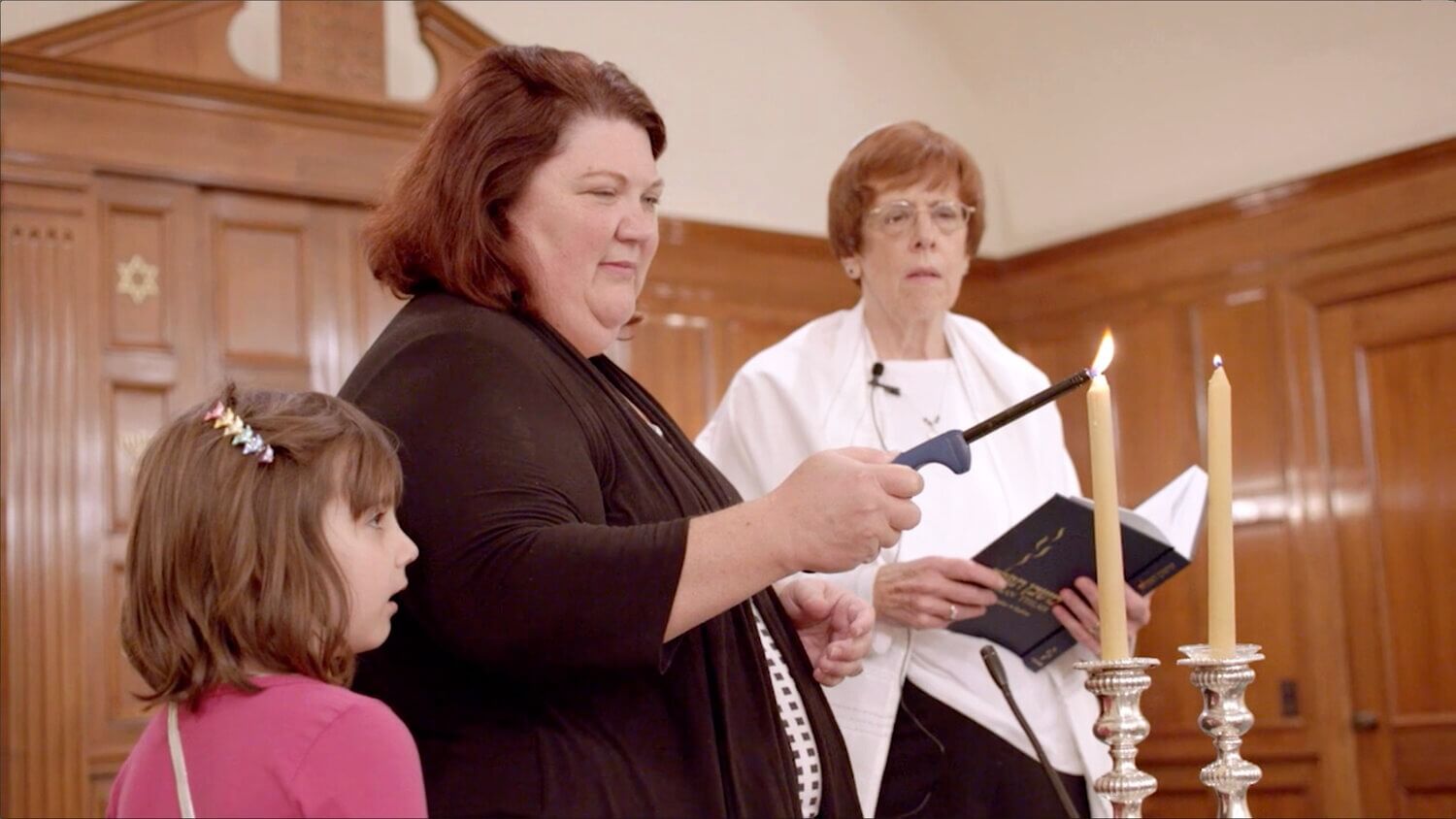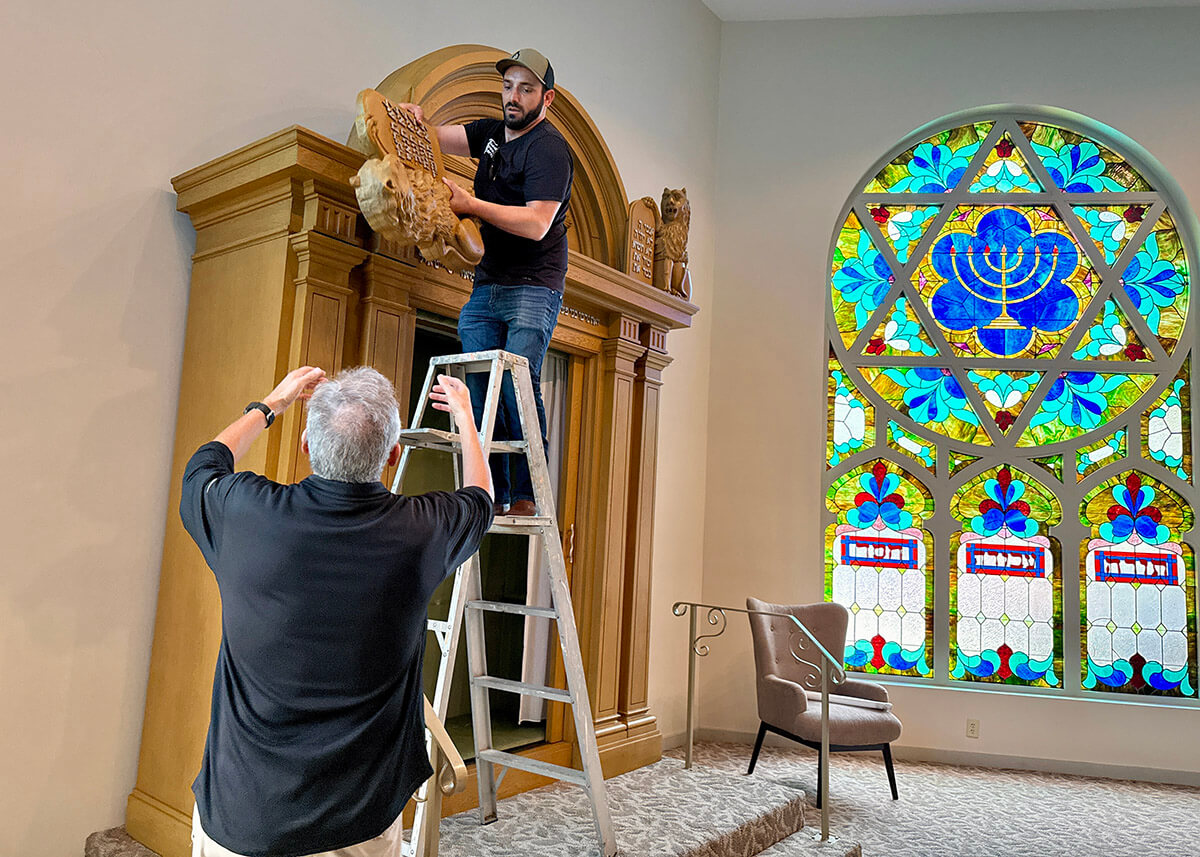An Alabama millionaire offered Jews $50,000 to move to his town. 16 years later, what’s left?
Dothan’s Temple Emanu-El synagogue made national headlines with a bold plan to revive Jewish life

Karen Arenson and her daughter Emily light the Shabbat candles at Temple Emanu-El in Dothan, Alabama, as Rabbi Lynne Goldsmith looks on, in a scene from the 2016 documentary There Are Jews Here. Courtesy of 371 Productions
Jews in Dothan, Alabama — a peanut-farming hub with a deeply Christian identity and a population smaller than Yonkers — made an audacious offer in 2009: up to $50,000 for Jewish families willing to move there and join its Reform synagogue.
Alarmed by the shrinking membership at Temple Emanu-El, the only synagogue within 100 miles and one with roots stretching back nearly a century, Larry Blumberg, a local hotel magnate and lifelong member, feared the congregation his grandparents Hyman and Esther helped found would disappear.
So Blumberg launched a relocation initiative, part cash incentive, part faith-based gamble. The pitch: come help revitalize Jewish life in the Deep South. The story went viral. So many people visited the shul’s website, it crashed. There was a segment on NPR. Jay Leno joked about it on The Tonight Show. Howard Stern did a radio segment about it. Applications came in.
For Rabbi Lynne Goldsmith, who led the synagogue from 2007 to 2017, it was both heartening and humbling. “I think it was a very positive thing for the Dothan Jewish community,” Goldsmith said over Zoom this month from her home in Colorado, where she retired. “It certainly opened up the eyes of people in Dothan.”
Goldsmith, who became a rabbi after a career in accounting, was Temple Emanu-El’s first female clergy member — and Dothan, her first and only full-time pulpit. “People were just super, super nice,” she said of her days in Alabama. “I never experienced any antisemitism. I did experience some blatant ignorance. And I’m not saying that in a pejorative way. I mean that they just didn’t know.”
She recalled a man who walked into the synagogue and asked where they performed sacrifices. “We haven’t done them for 2,000 years,” she told him, then explained the evolution of Jewish practice.
Goldsmith’s husband, Robert, became the executive director of the Blumberg Family Jewish Community Services of Dothan and oversaw the relocation program. He visited communities across the country to screen prospective transplants. In the end, 11 families moved to Dothan under the program. Seven have since left.
The relocation project was profiled in the 2016 documentary There Are Jews Here. One couple featured in the film, Lisa and Kenny Priddle, moved from New York to Dothan in 2011. Lisa, a registered nurse, and Kenny, who helped maintain the synagogue building, led a congregational bowling team called the Mitzvah Misfits.
But they struggled with feeling isolated. “It’s very hard to be a Jew here,” Lisa Priddle told The Washington Post in 2018. Eventually, the Priddles moved back north.
Others stayed. Karen and Terence Arenson moved from Los Angeles and raised their daughter, Emily, in Dothan. They found a slower pace of life, a lower cost of living, and Southern hospitality. Emily graduated from a Dothan high school in May.
The redbrick synagogue itself grew — briefly. Membership at Temple Emanu-El rose from about 40 families to 75, many of them Jews in the area who were drawn in by the news headlines. The religious school, which Goldsmith said had just five students when she arrived, expanded to three classrooms.
Interfaith work blossomed. “We had an interfaith Thanksgiving service with seven different religions participating,” she recalled. “The mayor stood up and said, ‘I didn’t know we had any Hindus in Dothan.’ One of them had been practicing there for over 20 years.”
Still, sustaining that community proved difficult. Some participants left for jobs or to be closer to extended family. Others found the cultural and religious dissonance too much.
Historic decline in US synagogues
Temple Emanu-El, founded in 1929 by Jewish merchants from Eastern Europe, is one of many across rural America facing existential questions. For more than a century, the number of synagogues in America had steadily climbed — a reflection of immigration, assimilation, and Jewish ambition. But by the 1990s, the momentum had stalled. In the decades that followed, it reversed. There are approximately 20% fewer synagogues today than there were in 1990, according to data gathered by Alanna E. Cooper, a religious studies professor at Case Western Reserve University.
More synagogues close each year than open. Cooper said that for the first time in American history, the number of synagogues in the country is declining, rather than rising.
The Jewish Community Legacy Project, a nonprofit founded in 2010, has helped 41 synagogues close down and has been in touch with hundreds more. The group recently worked with Temple B’nai Israel — founded in 1912 in the once-bustling mill town of McKeesport, Pennsylvania, and closed this May — to find a new home for its sacred objects. Its ark, bimah, and 12 stained glass windows were among the items picked up by a 40-year-old Jewish farmer who is building a synagogue in a two-acre cornfield in rural Illinois.

Nearby, the Orthodox Gemilas Chesed — founded in McKeesport in 1886 — tried the Dothan approach. In 2022, it offered Jews $100,000 to relocate there. The deal came with strict requirements, including showing up daily for minyan and an hour of Torah study. It had limited success. The synagogue no longer has a full-time rabbi and does not always get 10 men for weekday services.
Others also tried following Dothan’s path. In 2012, a Reform synagogue in Meridian, Mississippi, offered $25,000 to families willing to stay five years. Just last year, community leaders in Providence, Rhode Island, launched their own $50,000 incentive program to attract Orthodox families.
In many places, religious demographics continue to shift. Some communities dwindle, others merge or reinvent themselves. Goldsmith believes Dothan’s approach offers a lesson — not just in creativity, but in welcoming.
“Don’t put up barriers,” she said. “Don’t say your kid can’t have a bar mitzvah if they haven’t been in religious school for three years. Work with what you have.”
Her own time in Dothan was marked by that ethos. Without a mikvah for miles, she conducted conversions in the Gulf of Mexico. She held festival services even when only a handful came — so they could recite the Yizkor memorial prayer.
The program eventually died down, the Blumberg Family Jewish Community Services of Dothan closed. But for Goldsmith, its legacy is less about numbers and more about presence. She remembers returning four times in the year after she retired — to officiate funerals.
But the cash offer’s afterlife lingers — not in statistics, but in the continued presence of a small Jewish community in southeast Alabama.
Today, Temple Emanu-El is smaller than it was at its peak. The classrooms are quieter, but the doors are still open, the lights are still on — and on Shabbat, there’s a new rabbi welcoming Dothan’s Jews.

















